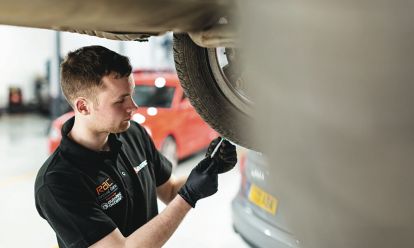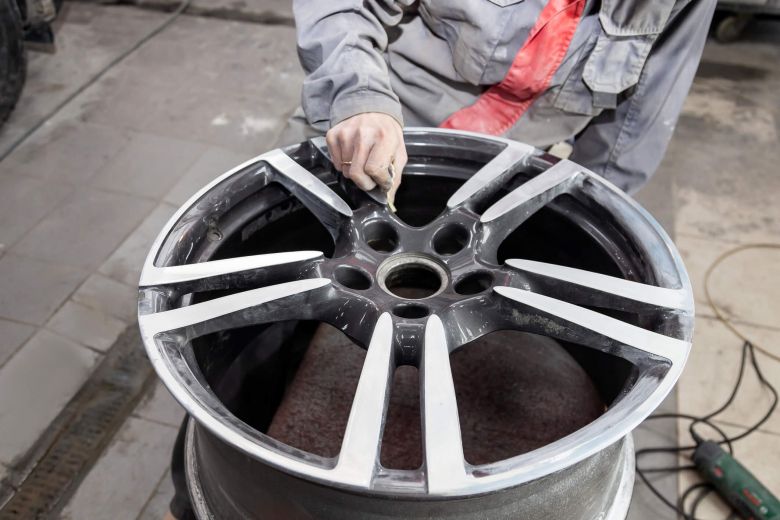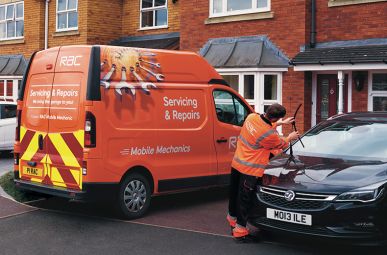The result is a damaged look to your rims, which not only looks bad but devalues your car when it comes to sell on. But don’t fear as, in most cases, they can be easily fixed.
This guide looks at what you’ll need to do, whether you should refurbish them yourself, and how much alloy wheel refurbishment costs on average.
What are alloy wheels?
Alloy wheels are the rims that hold your tyres to the rest of the vehicle, that are then connected to the axle and braking system.
They are made with a combination of metals, most commonly being aluminium alloy in modern vehicles.
Alloy wheels are popular in automotive design due to their lighter weight, which can improve performance and fuel efficiency compared to traditional steel wheels.
Aesthetically, they are also more popular with drivers, and they also offer better heat conduction and enhance braking performance of the vehicle. Nowadays, the vast majority of new cars have alloys.
Although it isn’t the most important component of tyre safety, regular maintenance of your alloys and ensuring your whole wheel system is working perfectly is important for all drivers.
Common damage to alloy wheels
When it comes to the most likely damage you will see to alloy wheels, it will be a scratch, dent or chip to the outside of the alloy – often accompanied by damage to the tyre tread or sidewall.
These are often as a result of clipping a curb while driving or parking, hitting a pothole, or as the result of an incident with another vehicle.
It can also be as a result of debris or stones on the road.
A more uncommon reason for damage to your alloys, can be from using the wrong cleaning materials.
Alloys are often covered in a protective sealant to keen the tyre safe. Over time, using the wrong products will break down the shielding layer, and ruin your shiny wheels.
How much does it cost for alloy wheel refurbishment?
On average, refurbishing alloy wheels can cost anywhere between £50 and £120.
If you are looking to refurbish your alloy wheels, then you’ll need to consider how much damage they have suffered, the type of car you drive, how premium the model is, and several other factors.
The overall cost may or may not include the price to have your alloy wheels refitted. Check this with your mechanic.
You may also need to have your wheels rebalanced, if the incident that caused the damage the alloys impacted the steering.
Having high quality and well-maintained alloys will increase the value of your car when it comes to selling it.
Although it is more aesthetically pleasing to see a high-quality finish on an alloy wheel, it also increases the safety of the vehicle.
Diamond cut alloy wheels
Diamond cut alloy wheels involve a type of finish that uses a lathe to cut very thin layers of metal from the wheel's surface.
This cutting process creates a distinctive shiny yet textured finish.
The reason for its name is due to what the alloys look like after the work has been carried out.
In many cases, the cut is in a pattern, and the remaining surface is often coated or painted for additional protection.
The vehicle owner will also likely have a say in the design of the finish.
Diamond cut alloys are more common in premium models and can be expensive to have – and repair.
Diamond cut alloy wheel refurbishment cost
As diamond cut alloy wheels are a higher quality and more desirable option, they come with a high price tag.
Prices start from £120, but this would be for smaller wheels (under 20 inches). For larger models, this price can increase exponentially. If you are having all four diamond cut alloy wheels refurbished, you could expect to see a bill of more than £1,000.
Powder coating alloy wheels
Powder coating alloy wheels is another option for drivers looking to have a nice finish on their alloy wheels.
The process to have this type of finish to an alloy wheel is different to most other options.
Once you have removed and cleaned the wheel, a mechanic will preheat the alloy wheels in an oven to remove any residual moisture and to prepare the surface for powder coating.
Following this they will spray the electrostatically charged powder onto the preheated wheels. The powder sticks to the metal due to the electrostatic charge.
The wheels are then put back in the over, where the powder melts to form the coating on the alloy.
They a then left to cool before being reattached to the vehicle.
Will powder coating cost extra?
In the vast majority of cases, powder coating your alloy wheels will not cost your extra - in fact it will likely be included within the original cost.
However, for higher spec models, there may be an additional cost of up to £100.
Can you refurbish car alloys yourself at home?
Yes, you can refurbish your own alloys wheels at home. In order to do this, you will need to follow the steps outlined earlier in this article.
However, this is a long and delicate process, and if done incorrectly will cause safety issues – and likely end up costing more money than it would to have the work carried out by an experienced mechanic.
How to repair alloy wheels
Here is the step-by-step guide on how to refurbish allow wheels – however, if you are unsure how to carry this out, contact your trusted local garage.
To refurbish alloy wheels, follow these steps:
- The first step is to clean the wheels by removing dirt, brake dust, and other stains. This will make is easier to see how extensive the damage to the alloys is.
- Following this, you will need to take off the wheels to carry out any work.
- Lay the wheels with the damaged side facing upwards, and then use paint stripper to remove the existing finish – or what remain of it. This is a key stage to remove it from all areas of the wheel, as when you come to reapply it later, it may look uneven or discoloured.
- Be careful when doing this and use gloves to protect your hands. Take your time as you don’t want to damage the wheel any further.
- The next step is to fill in any dents, scratches, or chip with a suitable alloy wheel filler. You can find this at most motoring retailers, including RAC Shop.
- Once you have filled in all the damaged areas, let the filler dry. Following this, you will need to sand the repaired areas to ensure a smooth surface.
This needs to be done to a very high standard, as an uneven could impact your driving.
It is advisable to use progressively finer sandpaper on the areas that have had filler used on them.
Once you are satisfied, coat the wheels with a high-quality primer. This protects the wheels from the elements, by providing corrosion resistance and a layer of protection against surface damage.
You’ll then need to paint the wheels. Make sure it is the same colour as the other wheels! It is likely that multiple layers will need to be applied to get the desired finish. Check the label for instructions on this. This is another layer of protection for the wheel.
Leave your wheels in a dry area, where they can ‘cure’ and set. This will also be outlined on the label of your primer.
Finally, you can put your wheels back on your vehicle. Ensure this is done correctly, as safety is the most important thing for any driver carrying out maintenance to their car.
Alloy wheel refurbishment near me
If you are looking to get your car alloys refurbished, then check out the RAC Approved Garage Network, who can help you with important maintenance and repairs on your vehicle.
For drivers looking for new tyres, visit RAC Tyres.
If you have any questions about alloy wheels, then leave them in the comments below.
Service, repair or MOT?
You can trust the RAC with our local approved garages and NEW mobile mechanics.












